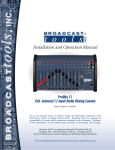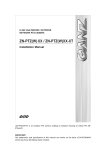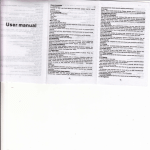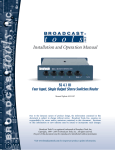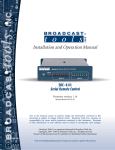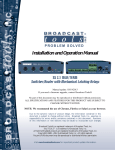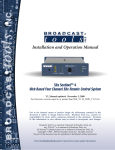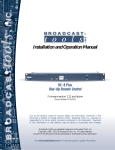Download Broadcast Tools ProMix 12 Specifications
Transcript
INC ® Installation and Operation Manual ProMix 12 Full-featured 12 Input Audio Mixing Console Rev-RB Manual Update: 10/28/08 Due to the dynamic nature of product design, the information contained in this document is subject to change without notice. Broadcast Tools, Inc., assumes no responsibility for errors and/or omissions contained in this document. Revisions of this information or new editions may be issued to incorporate such changes. Broadcast Tools® is a registered trademark of Broadcast Tools, Inc. Copyright, 1989 - 2007 by Broadcast Tools, Inc. All rights reserved. No part of this document may be reproduced or distributed without permission. Visit www.broadcasttools.com for important product update information. ProMix 12 Installation and Operation Manual INTRODUCTION Thank you for your purchase of a Broadcast Tools® ProMix 12 Fullfeatured 12 input audio mixing console (referred to as the ProMix 12 throughout this manual). We’re confident that this product will give you many years of dependable service. This manual is intended to give you all the information needed to install and operate the Broadcast Tools® ProMix 12. SAFETY INFORMATION CAUTION! Broadcast Tools® Products, as with any electronic device, can fail without warning. Do not use this product in applications where a life threatening condition could result due to failure. Only qualified personnel should install Broadcast Tools® products. Incorrect or inappropriate use and/or installation could result in a hazardous condition. Broadcast Tools, Inc., is unable to support NON-Broadcast Tools software, hardware or NON-Broadcast Tools computer/hardware/software problems. If you experience these problems, please research your hardware/software instruction manuals or contact the manufacturers technical support department. NOTE: This manual should be read thoroughly before installation and operation. WHO TO CONTACT FOR HELP If you have any questions regarding your product or you need assistance, please contact your distributor from whom you purchased this equipment. If you would like more information about Broadcast Tools® products, you may reach us at: Broadcast Tools, Inc. 131 State Street Sedro-Woolley, WA 98284-1540 USA Voice: 360 . 854 . 9559 Fax: 866.783.1742 WEBSITE: Visit our web site for product updates and additional information. Internet Home Page: www.broadcasttools.com E-mail: [email protected] THANK YOU FOR CHOOSING BROADCAST TOOLS® BRAND PRODUCTS! INTRODUCTION e-mail: [email protected] v o i c e : 360.854.9559 fax: 866.783.1742 2 ProMix 12 Installation and Operation Manual 1.0 DESCRIPTION The ProMix 12 is a full-featured audio mixing console ideally suited for the typical broadcast studio or any similar application. It features inputs for 3 microphones and 9 stereo line sources, two stereo mixing buses, a “mix-minus” output, a mono output, and comprehensive cue and monitoring systems. Other functions include an announce booth output with full duplex talkback, accurate audio level metering, remote control of Microphone channels and remote-start facilities on all line input channels. 2.0 INSTALLATION (See Figure 1 for connectors and controls (x) referenced in the text.) 2.1 AUDIO CONNECTIONS 2.1.1 MICROPHONE INPUTS The ProMix 12 has inputs for up to 3 microphones. Microphones should be lowimpedance professional units with balanced outputs. Dynamic microphones are suggested. Powered condenser s can be used, although the console does not provide phantom power. Connect microphones to the female XLR connectors (1) on the rear of the console. The microphone plug should be wired as follows: PIN 1: Ground PIN 2: Hi PIN 3: Lo. 2.1.2 MICROPHONE PROCESS INSERT The ProMix 12 provides for the insertion of external processing equipment, e.g, a microphone limiter or equalizer. External microphone processing equipment should be interfaced via the T/R/S microphone process Insert jacks (2). These jacks provide a means of inserting processing gear just after the console’s microphone preamps, but before the microphone channel faders. The microphone preamp output and return circuits are unbalanced, at a nominal level of –10dbm. Wire the mating T/R/S plug as follows: TIP: To processor input (from microphone preamp output) RING: From processor output (to console fader input) SLEEVE: Ground. NOTE: For the “R0, RA and RB” version of the console, internal shunt (jumper JP1 (Mic-1), JP2 (Mic-2) or JP3 (Mic-3) must be removed on the I/O circuit assembly (the bottom cover must be removed to access these jumpers). WEBSITE: Visit our web site for product updates and additional information. DESCRIPTION e-mail: [email protected] v o i c e : 360.854.9559 fax: 866.783.1742 3 ProMix 12 Installation and Operation Manual 2.1.3 LINE INPUTS The ProMix 12 accommodates up to 9 stereo “line level” sources. Source equipment can be either balanced or unbalanced, operating at either professional (+4dBm) or consumer (-10dBm) levels. It is connected via the Line Input T/R/S jacks (3). The upper jacks are for Left channel inputs; the lower jacks are for Right channel inputs. Mating TRS plugs should be wired as followed: Unbalanced sources: TIP: RING: SLEEVE: Hi (or “hot” lead) (leave unconnected) Ground (or shield) Balanced sources: Hi Low Ground TIP: RING: SLEEVE: Note: The console terminates the Low input to ground via a 1K resistor. In some cases, connecting the Low audio lead to Ground will produce a slightly higher audio level. However, check the manual of the source equipment to be certain grounding the Low output lead will not cause problems. It is generally OK to do so on older transformer-coupled outputs; active (transformerless) outputs may or may not permit this. 2.1.4 USING A TELEPHONE HYBRID If the console will be interfaced to a telephone hybrid (for broadcasting telephone calls), the Receive (“caller”) output of the hybrid should be fed into Channel 4. This is because the Mix Minus output of the console contains ALL line sources mixed to the AUDITION bus, except for Channel 4. The” Audition-minus-caller” Mix Minus output is normally fed back to the hybrid’s send input. The caller will therefore be able to hear all program sources mixed on the Audition bus, minus him. 2.1.5 AIR MONITOR INPUT The console provides a Monitor Air input (4) that can be used to feed an off-air monitor into the console’s Monitor system. This input is electrically identical to the other Line channel inputs, and should be connected the same way. Any tuner or demodulator can be used. INSTALLATION e-mail: [email protected] v o i c e : 360.854.9559 fax: 866.783.1742 4 ProMix 12 Installation and Operation Manual 2.1.6 MAIN MIX BUS OUTPUTS The console’s six main mixing bus outputs appear on male XLR connectors (5). All outputs are electronically balanced; each will drive a 600-ohm load. The nominal level is +4dBm. Connect as follows: PIN 1: Ground PIN 2: Hi PIN 3: Lo Note: To feed an unbalanced load, connect to Pins 1 & 2 only. DO NOT SHORT PIN 3 TO GROUND! It is not necessary to terminate any console outputs. 2.1.7 MONITOR OUTPUT The console’s Monitor outputs (6) are via a T/R/S jack. These outputs are unbalanced, and will drive 600-ohm loads. (Termination is not necessary.) The nominal level is –10dBm. Connect the mating TRS plug as follows: TIP: Left Monitor output RING: Right Monitor output SLEEVE Ground 2.1.8 BOOTH OUTPUT The console provides a secondary Booth monitor output (7) that can be used to drive headphones worn by an announcer in an “announce booth”. This output, via T/R/S jack, will drive headphones of 24 ohms or higher. (Termination is not necessary.) The nominal output level is 0dBm. The mating TRS plus should be wired as follows: TIP: Left Booth output RING: Right Booth output SLEEVE: Ground 2.1.9 CUE/TALKBACK OUTPUTS WEBSITE: Visit our web site for product updates and additional information. The console provides outputs to drive external amplified speakers for monitoring the Cue bus and Talkback circuit (8). Using the Cue output is optional, as the Cue bus can be monitored via the Monitor system (with the CueMix function) as well as via the Phones output. The Talkback output must be connected to an external (amplified) speaker if this feature is to be used. The Cue and Talkback outputs are unbalanced and will drive 600-ohm loads to a nominal level of –10dBm. (Termination is not necessary.) Inexpensive “computer speakers” are ideal for use with the Cue and Talkback outputs (audio quality unimportant). The mating T/R/S plug should be wired as follows: TIP: Cue output RING: Talkback output SLEEVE: Ground INSTALLATION e-mail: [email protected] v o i c e : 360.854.9559 fax: 866.783.1742 5 ProMix 12 Installation and Operation Manual 2.2 CONTROL INTERFACE 2.2.1 MICROPHONE 2 & 3 REMOTE CONTROL The console provides for remote control of Microphone 2 and Microphone 3 via the Microphone 2 & 3 Remote Control connector (9). This 15-pin D connector should be wired according to Figure 2. Note that “cough switches” for microphones 2 & 3 can be installed for use by the console operator if these microphones will be used in the studio. If these cough switches are not used, jumpers (see note below) must be installed as shown between pins 9 & 10 and between pins 13 & 15. Mics 2 & 3 will not operate if these jumpers are missing. Cough switches can also be installed for remote use, as shown connected to the remote ON switches. If the “cough switches” are not used, jumper wires must be installed in their place (See note below). NOTE: On version A & B, jumpers JP1 (Mic-1) and JP4 (Mic-2) may be installed on the main circuit assembly (the bottom cover must be removed to access these jumpers), eliminating the need to solder jumpers on the connector. LEDs can be used to show “Microphone ON”; be sure to include the 1K resistors as shown. (This value can be changed to set LED brightness.) The Talkback function allows the booth announcer to talk directly to the console operator (off-air) via the Talkback system. The MUTE TALLY relay on pin 4 (ground is pins 1 & 5) provides a means of switching external equipment when the monitor mutes. The relay contact goes to ground when the monitor is muted. It can be used to operate “ON AIR” warning light controllers, etc. Contact rateing are 30vdc @ 1amp or less. DO NOT EXCEED THIS RATING. NEVER CONNECT THESE CIRCUITS TO A 110 VOLT AC LINE! 2.2.2 LINE CHANNEL REMOTE CONTROL The console provides 9 momentary SPST switches than can used for “remote start” of line channel source equipment, e.g, CD players, tape decks, etc. Interface to these switches is via Line Channel Remote Starts connector (10), a 25-pin D connector. WARNING: The maximum voltage that can be applied to Remote Start switches is 24vdc @ 100ma or less. DO NOT EXCEED THIS RATING. NEVER CONNECT THESE CIRCUITS TO A 110 VOLT AC LINE! Connect the mating 25-pin D connector according to Figure 3. INSTALLATION e-mail: [email protected] v o i c e : 360.854.9559 fax: 866.783.1742 6 ProMix 12 Installation and Operation Manual 2.3 POWER INPUT Plug the console’s external power supply into the Power jack (11). Do not use any power supply not supplied with the console. The power supply is a “universal input” type, and can be used with any AC input voltage between 100 and 250 VAC, either 50Hz or 60Hz. No changes to the power supply are needed. The AC mains cord must have a connector appropriate for the AC socket being used. 3.0 3.1 ADJUSTMENTS AND SETUP GAIN ADJUSTMENT Each of the 3 microphone input channels has a GAIN adjustment (12) to optimize the microphone preamp gain for the microphones being used. The gain can be varied over a 20dB range. Use a small screwdriver to adjust the gain trimmers as needed. Microphone gain is properly adjusted when the preamp output (accessible via the TIP of the Microphone Process Insert (2) T/R/S jacks) is about –10dBm when speaking into the microphone. To quickly set microphone gain, follow these steps: 1. Assign the microphone channel to the Program bus. 2. Set the microphone channel fader to –15db. 3. Speak into the microphone; set gain so that voice peaks read about 0VU on the console VU meters. 3.2 MICROPHONE CHANNEL MONITOR MUTE PROGRAMMING The console’s Monitor system can be programmed so that when Microphone 2 and/or Microphone 3 are on, the audio output from the Monitor system is muted. If Microphone 2 or Microphone 3 is located in the same studio as the Monitor speakers, the Monitor system should mute to prevent acoustic feedback when the Microphone is ON. Programming Microphone 2 and/or Microphone 3 to mute the Monitor system is done by installing jumper wires on the Microphone 2 & 3 Remote Control connector (9). See Figure 2. To enable Microphone 2 monitor mute, install a jumper between pins 3 & 11(see note below). To enable Microphone 3 monitor mute, install a jumper between pins 7 & 11 (see note below). NOTE: On version A & B, jumpers JP2 (Mic-2) and JP3 (Mic-2) may be installed on the main circuit assembly (the bottom cover must be removed to access these jumpers), eliminating the need to solder jumpers on the connector. WEBSITE: Visit our web site for product updates and additional information. SETUP e-mail: [email protected] v o i c e : 360.854.9559 fax: 866.783.1742 7 ProMix 12 Installation and Operation Manual 3.3 TALKBACK MICROPHONE INPUT The console includes a Talkback system that permits the console operator to speak to an announcer who is wearing headphones connected to the Booth output. When the TALKBACK button is pressed, the “normal” audio being fed to the Booth output is interrupted and is overridden by audio from the Talkback circuit. Because Microphone 1 is normally used as the “console operator Microphone”, Microphone 1 is used to talk back to the Booth announcer. Another audio source can be substituted for Microphone 1 (e.g, an intercom output) if necessary. See Figure 2 (Section 2.2.1). The jumper between pin 12 and pin 8 should be removed. External Talkback audio can be fed into pin 8 (ground is pins 1 or 5). This input is unbalanced; the nominal input level should be about –10dBm. 3.4 LINE CHANNEL GAIN ADJUSTMENT Each of the console’s nine Line channel inputs has an Input Sensitivity switch (13) that must be set according to the source equipment being used with each Line channel input. These switches can be operated using the eraser-end of a pencil. There are two settings: OUT and IN. Set the switches OUT for professional levels, e.g, +4dBm or +8dBm; set switches IN for use with “consumer” equipment operating at about –10dBv. (The Line channel inputs are bridging and will not load source equipment.) 4.0 OPERATION (See Figure 4 for controls (x) referenced in the text.) Operation of the ProMix 12 is simple and straightforward. Audio sources can be mixed to the Program and/or Audition buses. Line channels can be also be fed to the Cue bus. The console’s outputs can be monitored via the Monitor system and VU meters. The console operator can also use headphones, plugged into the Phones output. A separate Booth output can feed headphones used by a booth announcer. The console operator can talk to the booth announcer using the Talkback function; the booth announcer can respond using the Talkback feature in the announce booth. 4.1 MICROPHONE INPUT CHANNELS Microphone channels are turned on and off using the Microphone ON/OFF buttons (1). When a Microphone is ON, the “ON” LED (4) will be illuminated. Microphone audio can be assigned to the Program bus using the PGM button (2). The AUD button (3) assigns Microphone channel audio to the Audition bus. Both buses can be used simultaneously. The relative mix level is determined by the FADER (5). The “normal” position is –15dB, which yields 15dB of “in hand” gain. Microphone 1 is pre-programmed to mute the Monitor system when Microphone 1 is on. Microphones 2 and 3 can be user-programmed to mute the Monitor system if necessary. (See Section 3.2.) e-mail: [email protected] v o i c e : 360.854.9559 fax: 866.783.1742 OPERATION 8 ProMix 12 Installation and Operation Manual 4.2 LINE INPUT CHANNELS Line channels are assigned to the Program and/or Audition bus using the PGM buttons (2) and AUD buttons (3). Both buses can be used simultaneously. Line channels can be “previewed” by using the Cue bus. Pressing the CUE button (7) will override other bus assignments, and send the audio to the Cue system (pre-fader). The relative mix level of line sources is determined by the FADER (6). The “normal” position is -15dB, which yields 15 dB of “in hand” gain. Line channel source equipment can be remotely started using the START button (8) directly below each line channel fader. 4.3 MONITOR SYSTEM The console’s main mix buses (PGM, AUD, and CUE) can be monitored via the Monitor system. In addition, audio from an off-air monitor can be heard through the Monitor system. A unique feature of the PROMIX 12 is the “CueMix” system, whereby audio on the CUE bus can be heard through the Monitor system, providing the console operator Cue bus audio that is superior then that coming from the traditional “cue speaker” found on most other consoles. Other Monitor functions include the ability to switch the Monitor output to monaural (to check for phase errors) and a DIM function that instantly lowers the Monitor output by 20dB. Two buttons determine what is normally heard on the Monitor system. The PGM/AUD button (9) selects either the Program or Audition bus. If the button is up, the Program bus is heard; if the button is down, the Audition bus is heard, provided that the BUS/AIR button (10) is up. If the BUS/AIR button (10) is down, the PGM/AUD selection is overridden, and the audio source fed into the Monitor Air input will be heard. This is normally fed with an off-air demodulator or tuner for monitoring the station’s transmitted signal. WEBSITE: Visit our web site for product updates and additional information. The Monitor system volume is adjusted using the Monitor FADER (11). The (external) monitor amplifier should be adjusted so that the Monitor system produces adequate volume with the Monitor fader set to about –15dB. The Monitor DIM button (13) attenuates the monitor volume by 20dB. The MONI MONO button (14) combines the Monitor output to monaural. This is useful for checking mono compatibility of stereo signals. Note that this button affects only the monitor audio; it has no effect on the main mix bus outputs. 4.4 CUE SYSTEM AND “QUEMIX” One unique feature of the ProMix 12 is the CueMix system. This allows the console operator to listen to audio signals on the CUE bus through the main monitor speakers, rather than the usual small ineffective “cue speaker” found on most broade-mail: [email protected] v o i c e : 360.854.9559 fax: 866.783.1742 OPERATION 9 ProMix 12 Installation and Operation Manual cast consoles. To use the CueMix feature (for example, to preview a track on a CD), follow these steps: 1. Put the CD player’s line input channel in CUE mode by pressing it’s CUE button (7). 2. Turn the CueMix feature ON, by pushing the QMIX button (12) down. The Monitor system will dim, reducing “normal” bus audio by 20dB; CUE bus audio will be heard through the right monitor speaker. Adjust Cue audio level using the CUE LEVEL control (24). Preview the source. 3. Once the CD is “ready for air”, release the QMIX button and the CUE button for the CD player channel. The Monitor system will return to normal operation. The Cue system can also used in a “conventional” manner with the addition of an external (amplified) cue speaker, connected via the CUE/TB output jack. (See Section 2.9.) The audio level at this jack is controlled by the CUE LEVEL control (24). This Cue audio output mutes whenever the Monitor system is muted. The cue bus can also be heard via the console operators PHONES output. (See Section 4.5) 4.5 PHONES OUTPUT The console operator can monitor the console’s Monitor output via the PHONES jack (15). Headphones of 24 to 600 ohms can be used. Do not use older 8-ohm headphones. The MONI/CUE button (16) determines what is heard through the headphones. If this button is up, the headphones will “follow” whatever audio source is selected for the Monitor system. If the button is down, the headphones will monitor the Cue bus. The headphone volume is adjusted with the PHONES control (17). 4.6 BOOTH OUTPUT The console provides a secondary headphone output for use by an announcer in an “announce booth”. The MONI/AUD button (18) determines what the booth announcer hears. If the button is up, the announcer will hear the same audio heard by the console operator via the Monitor system. If the MONI/AUD button (18) is down, the announcer will hear the Audition bus output. This allows the Audition bus to be used to create a special “announcer mix”. The Booth headphone level is adjusted with the BOOTH control (19). Use headphones with an impedance of 24 ohms or higher. Do not use older 8-ohm headphones. 4.7 TALKBACK SYSTEM The console includes a full-duplex Talkback system that allows the console operator to converse with the booth announcer, off-air. (To use the system in duplex OPERATION e-mail: [email protected] v o i c e : 360.854.9559 fax: 866.783.1742 10 ProMix 12 Installation and Operation Manual mode, an external amplified speaker must be connected to the TB OUTPUT as described in Section 2.9.) If the TALKBACK button (20) is pressed and held down, the “normal” audio feeding the Booth output is overridden with audio from Microphone 1 (the console operator’s Microphone). The booth announcer can respond by pressing the remote TALKBACK button (connected per Figure 2; see Section 2.2.1.) The console operator via the Talkback speaker will hear the announcer’s Microphone. (One-way operation is possible without using the Talkback speaker. The console operator can still speak to the announcer, however the announcer cannot reply.) 4.8 MONO OUTPUT The console includes a Mono output that provides a summed (L+R) signal of either the Program or Audition bus. The MONO OUT: PGM/AUD button (21) determines which bus is sent to the Mono output. If this button is up, the Program bus fed to the Mono output; if it is down, the Audition bus is fed to the Mono output. The Mono output is always at the same level at the Program and Audition bus outputs. 4.9 MIX-MINUS OUTPUT The console’s Mix-Minus output is a monaural mix of all sources assigned to the Audition bus, except for Line channel #4. This input should be used for the “Receive” (caller) audio from a telephone hybrid. The Mix-Minus output is therefore the same as the Audition mix, minus the caller. This Mix-Minus signal is normally fed back into the hybrid’s “Send” input. 4.10 VU METERS The ProMix 12 features accurate VU meters (23) to monitor the main bus output levels. Using the VU METER can meter either the Program or Audition bus: PGM/AUD button (22). If the button is up, the Program bus is metered; if it is down, the Audition bus is metered. Mix levels should be adjusted so most peaks read about 0VU. The meters are calibrated so that 0VU equals +4dBm on the main bus outputs. WEBSITE: Visit our web site for product updates and additional information. OPERATION e-mail: [email protected] v o i c e : 360.854.9559 fax: 866.783.1742 11 ProMix 12 Installation and Operation Manual 5.0 SPECIFICATIONS* 5.1 AUDIO INPUTS & OUTPUTS MICROPHONE inputs: MIC Process: LINE inputs: AIR input: MAIN outputs: CUE/TB outputs: -60dBm to –40dBm, 10K, balanced Post-preamp loop-thru: -10dBm, unbalanced -10dBv or +4dBm, 10K, balanced or unbalanced -10dBv or +4dBm, 10K, balanced or unbalanced +4dBm, balanced. 600 ohm load. Max output: +24dBm (Program, Audition, Monaural and Mix-Minus). -10dBm nom, unbalanced. 600 ohm load. Max output: +20dBm -6dBm nom, unbalanced. 24 ohm or higher load. Max output: +20dBm -6dBm nom, unbalanced. 24 ohm or higher load. Max output: +20dBm -10dBm, unbalanced. 5K load. Max output: +10dBm 5.2 AUDIO PERFORMANCE Frequency response: Microphone channel EIN: Output noise: Distortion: Input headroom: Output headroom: Crosstalk: 20Hz-15kHz, +/- 0.5dB -125dBm; 75dB S/N with 50dB preamp gain typical 75dB below nom output level, 1 Microphone channel on. 80dB below nom output level, 1 Line channel on. .02% THD, IM at nom output level; ,01% at max level 30dB (pre fader) 20dB (post fader) 65dB @ 1kHz 5.3 POWER REQUIREMENTS AC input: Power supply: Ground: Approvals: 100 to 240 VAC, 25 watts. Supplied switching supply Chassis grounded to mains ground via power supply cable UL, TUV/IEC, CSA, CE 5.4 PHYSICAL Size: Weight: Options: 18’W x 10.5”D x 4”H 10 lbs RA-PM, Rack mount adaptors. MONITOR output: BOOTH output: PHONES output: WEBSITE: Visit our web site for product updates and additional information. *Specifications subject to change without notice. SPECIFICATIONS e-mail: [email protected] v o i c e : 360.854.9559 fax: 866.783.1742 12 ProMix 12 Installation and Operation Manual LIMITED WARRANTY The term “Buyer” as used in this document refers to and includes both (but only) (a) any person or entity who acquires such an item for the purpose of resale to others (i.e., a dealer or distributor of an item), and (b) the first person or entity who acquires such an item for such person’s or entity’s own use. Broadcast Tools warrants to each Buyer of any item manufactured by Broadcast Tools that the item will be free from defects in materials and workmanship at the time it is shipped by Broadcast Tools if the item is properly installed, used and maintained. EXCLUSIVE REMEDIES If Broadcast Tools is notified, in writing, of a failure of any item manufactured by Broadcast Tools to conform to the foregoing Limited Warranty within one (1) year following the date of the Buyer’s acquisition of the item, and if the item is returned to Broadcast Tools in accordance with Broadcast Tools’ instructions for confirmation by inspection of the defect (which at Broadcast Tools’ election may include, without limitation, a requirement that the Buyer first obtain a Return Authorization number from Broadcast Tools, that the Buyer furnish proof of purchase in the form of an invoice and/or receipt, and that the Buyer prepay all freight charges associated with any return of the item to Broadcast Tools using such freight service as Broadcast Tools reasonably may specify), Broadcast Tools will repair or replace the defective item, or will refund the purchase price paid by the Buyer for the item. Broadcast Tools shall have the exclusive right to choose between these alternative remedies. NO OTHER WARRANTIES OR REMEDIES TO THE MAXIMUM EXTENT PERMITTED BY APPLICABLE LAW, BROADCAST TOOLS AND ITS SUPPLIERS DISCLAIM ALL OTHER WARRANTIES, EITHER EXPRESS OR IMPLIED, INCLUDING BUT NOT LIMITED TO IMPLIED WARRANTIES OF MERCHANTABILITY OR FITNESS FOR A PARTICULAR PURPOSE; AND THE FOREGOING ALTERNATIVE REMEDIES SHALL BE EXCLUSIVE OF ALL OTHER REMEDIES. THIS LIMITED WARRANTY GIVES YOU SPECIFIC LEGAL RIGHTS. YOU MAY HAVE OTHER RIGHTS, WHICH VARY FROM STATE/JURISDICTION TO STATE/JURISDICTION. N O L I A B I L I T Y FOR CONSEQUENTIAL D A M A G E S TO THE MAXIMUM EXTENT PERMITTED BY APPLICABLE LAW, NEITHER BROADCAST TOOLS NOR ANY OF ITS SUPPLIERS SHALL HAVE ANY LIABILITY FOR ANY SPECIAL, INCIDENTAL, INDIRECT, CONSEQUENTIAL OR PUNITIVE DAMAGES WHATSOEVER (INCLUDING, WITHOUT LIMITATION, ANY DAMAGES FOR LOST PROFITS, BUSINESS INTERRUPTION, LOSS OF DATA OR INFORMATION, COST OF CAPITAL, CLAIMS OF CUSTOMERS, OR ANY OTHER PECUNIARY LOSS) ARISING OUT OF THE USE OF OR THE INABILITY TO USE ANY ITEM SUPPLIED BY BROADCAST TOOLS, EVEN IF BROADCAST TOOLS HAS BEEN ADVISED OF THE POSSIBILITY OF SUCH DAMAGES HAVE ANY LIABILITY FOR ANY SPECIAL, INCIDENTAL, CONSEQUENTIAL, EXEMPLARY OR PUNITIVE DAMAGES. THIS LIMITATION OF LIABILITY APPLIES WHETHER A CLAIM IS ONE ALLEGING BREACH OF A CONTRACT OR WARRANTY, NEGLIGENCE OR OTHER TORT, FOR THE VIOLATION OF ANY STATUTORY DUTY, THE FAILURE OF ANY LIMITED OR EXCLUSIVE REMEDY TO ACHIEVE ITS ESSENTIAL PURPOSE, OR ANY OTHER CLAIM OF ANY NATURE. BECAUSE SOME STATES AND JURISDICTIONS DO NOT ALLOW THE EXCLUSION OR LIMITATION OF LIABILITY FOR INCIDENTAL OR CONSEQUENTIAL DAMAGES, THIS LIMITATION MAY NOT APPLY TO YOU. Broadcast Tools, Inc. 131 State Street Sedro-Woolley, WA 98284 • USA 360.854.9559 voice • 866.783.1742 fax [email protected] e-mail www.broadcasttools.com website LIMITED WARRANTY e-mail: [email protected] v o i c e : 360.854.9559 fax: 866.783.1742 13 ProMix 12 Installation and Operation Manual FIGURE 1 12 1 2 3 9 13 10 4 5 6 7 8 e-mail: [email protected] v o i c e : 360.854.9559 fax: 866.783.1742 11 14 ProMix 12 Installation and Operation Manual FIGURE 2 NOTE: Jumpers JP1, JP2, JP3, JP4 and JP5 may be installed on the main circuit assembly (the bottom cover must be removed to access these jumpers), eliminating the need to solder jumpers on the connector. Relay contact grounded when muted. e-mail: [email protected] v o i c e : 360.854.9559 fax: 866.783.1742 15 ProMix 12 Installation and Operation Manual FIGURE 3 e-mail: [email protected] v o i c e : 360.854.9559 fax: 866.783.1742 16 ProMix 12 Installation and Operation Manual 19 24 17 14 16 23 15 FIGURE 4 22 18 11 20 13 9 21 10 12 3 6 8 1 2 4 7 e-mail: [email protected] v o i c e : 360.854.9559 fax: 866.783.1742 5 17 ProMix 12 Installation and Operation Manual FIGURE 5 e-mail: [email protected] v o i c e : 360.854.9559 fax: 866.783.1742 18 ProMix 12 Installation and Operation Manual FIGURE 6 e-mail: [email protected] v o i c e : 360.854.9559 fax: 866.783.1742 19 e-mail: [email protected] v o i c e : 360.854.9559 fax: 866.783.1742 20 Insert Level SW -10/+4 LEGEND RT LT AIR Mon XLR SW Level CUE SW LED SW Off/On -10/+4 Chan 4-12 RT LT Line Inputs Chan 1-3 Trimmer Mic-Pre Date Modified: 05/16/07 Rev A & B MIC SW AUD SW PGM SW AUD SW PGM T/R/S 1/4” SW PGM AUD SW VU Meter SW BUS AIR VU Meter SW QMix Booth Phones CUE SW SW SW Talk Back (Minus Chan. 4) Moni MONO DIM Balanced Output Stage SW Moni AUD SW Moni CUE Moni Level Fader AUD SW PGM (MONO) Copyright © 1989-2007 by Broadcast Tools, Inc. All Rights Reserved. 131 State Street, Sedro-Woolley, WA 98284 • 360.854.9559 • Fax 866.783.1742 Visit us online at www.broadcasttools.com Rotary Pot Fader Fader Functional Diagram Full-Featured 12 Input Audio Mixing Console ProMix 12 MM MONO Mix-Minus Booth Out Phones Jack CUE Out Monitor Out AUD MONO Unbalanced Output Stage AUD PGM PGM ProMix 12 Installation and Operation Manual




















